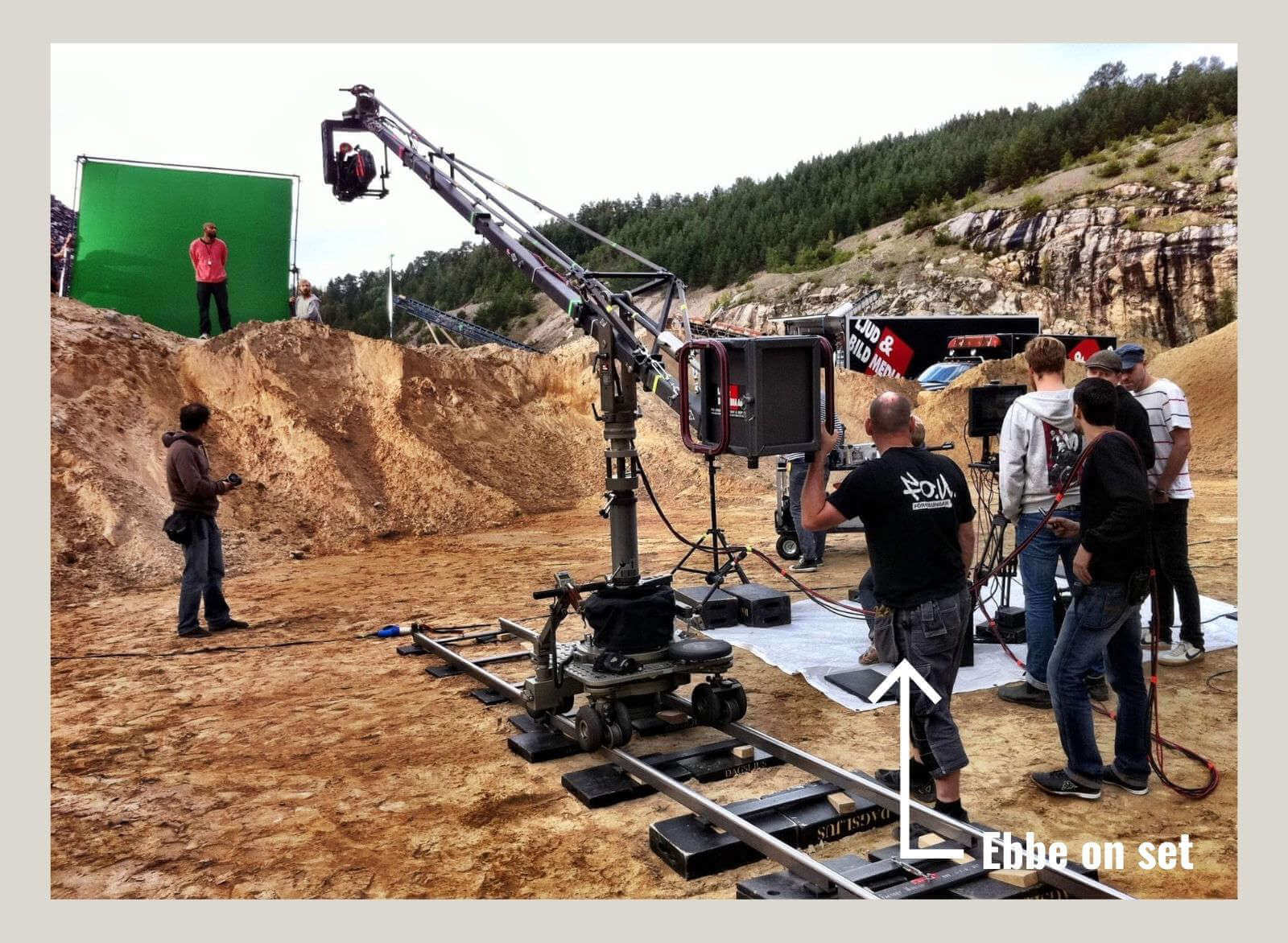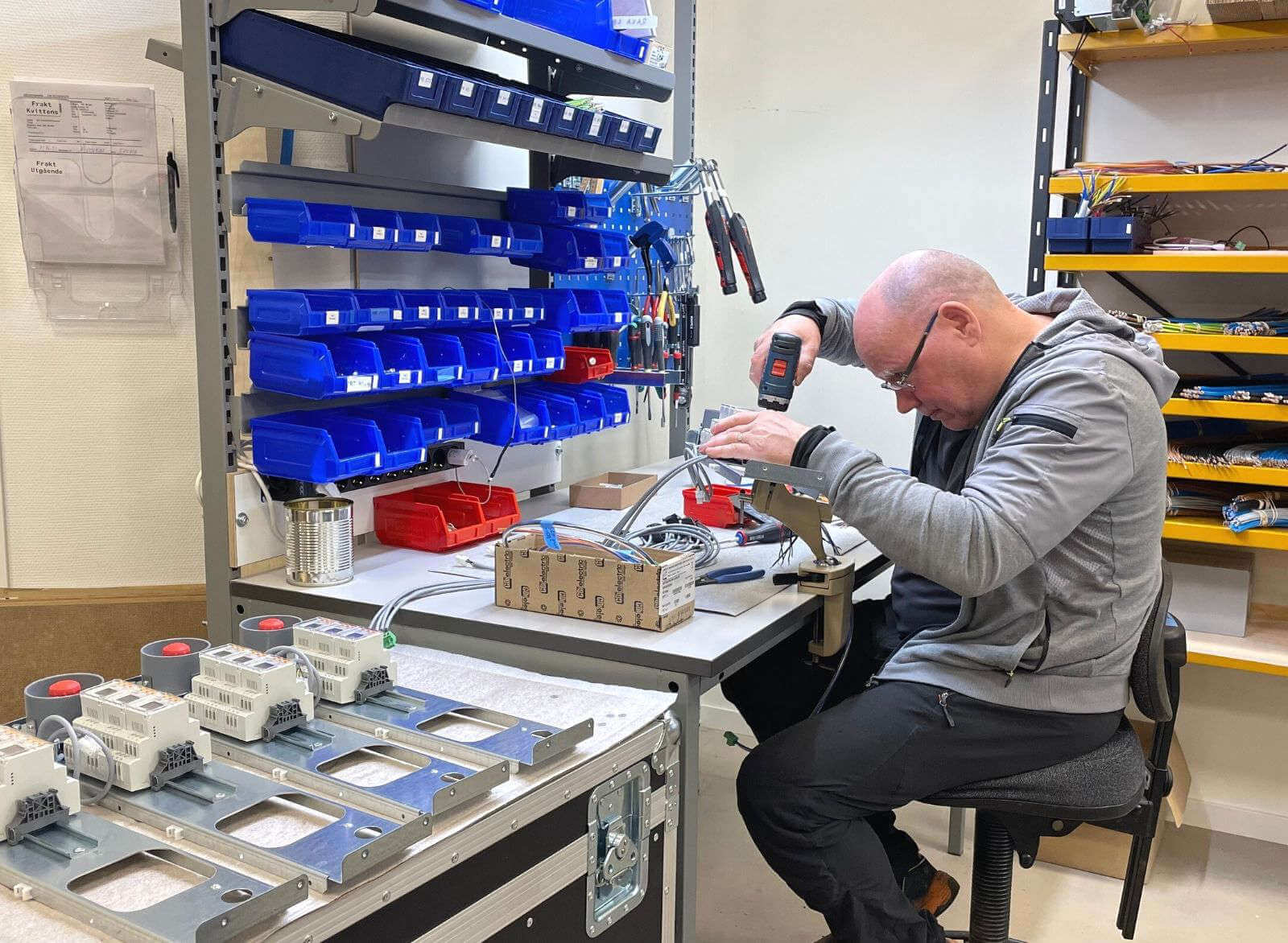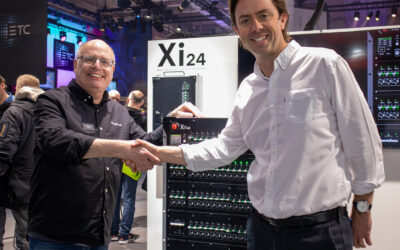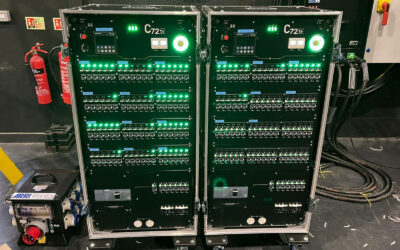StageSmarts very own dimmerman
This is Ebbe Wengenroth, and he is one of our highly valued employees who has a long history of working as a lighting technician. When I first met him, we talked a lot about cameras and film, quickly setting a common ground. But I have no way near the technical knowledge he has from within the event industry and with everything needed for an actual event to be held. We often forget about the people behind the scenes, but without them, there is no show.
Ebbe has a long history working the stages all over Europe, both in front, above and behind, for example, in film, tv and theatre productions, including various live shows.
His story fits our potential targets’ criteria, and now, he has chosen to be a part of our growing team StageSmarts. Thank you for coming onboard, Ebbe!Let’s hear what he has to say and get a more profound insight into how vital Power distribution systems are for the events industry.
Tell me about yourself. Where did your journey begin within the event industry?
My journey started by moving to Stockholm, Sweden. I began by doing small jobs and networking with people. One of the first was at a nightclub helping out with various arrangements, such as small gigs and the occasional fashion show. I was responsible for making everything on stage work. You could say that I was their tech guy. Sometimes, I also helped other rental companies with their equipment for various productions.
After a while, I moved on to work for Berns in Stockholm, a pretty large entertainment venue. They are well known for their events and shows. I was a part of their tech crew handling the lights and the electricity.
And the story goes on…
It was common for people like me to work in-house but also do other jobs every now and then. So as time went by, I went on to work for other companies related to the touring industry, companies such as Lightmen and Spectra. They introduced me to projects at the Globe Arena and some arrangements for the Royal Court. Doing different projects builds up your reputation and makes you a name that people want to work with. After that, more and more complex and extensive projects were offered to me. Doing things the right way and making sure not to be sloppy takes you a long way in terms of career and reputation.
I later returned to Berns, and after some time, the technical director asked me if I would be interested in touring, which made me begin my path learning all about the theatre field and how the life of touring is. Sweden’s National Touring Theatre (Riksteatern) was my absolute first big touring experience.
My role at this touring gig was lightning technician (a so-called Dimmerman).
How is the life of a touring technician?
I will never forget the work I did for the Cullberg Ballet, the most intense and challenging tour I ever did. Well, both tough and fun at the same time and this from a technician’s point of view. It’s not an easy life, but it definitely provides exciting job assignments like this one.
Cooperation is crucial when the assignment is advanced and the requirements unique. The crew and the creative people needed to be in sync. We had to use leapfrogging teams; every minute counted, and effectiveness was a key skill we all needed to have.
We often work around the clock. That is one of the sacrifices of touring, which is why the heart needs to be in it; otherwise, it won’t work. You build one event, then go off to another, fixing all the lights and putting everything in place for the next show, all that with very little sleep. Your colleagues become a temporary family that you trust. This is why we have to be professional and really well organized.
A minor fault can lead to millions in added costs for the organizer and, even worse, someone’s life. Touring gives you a lot, and you see parts of the world that you won’t see on a regular holiday trip. At the time, we didn’t have the Internet. We could not call our loved ones every day, so the traditional family life was really non-existent for persons constantly touring, and most would agree that life on the road certainly has its ups and downs. I toured for a few more years, then I decided to take a short break. Got back to Berns again but jumped right back on tour after a short time.
What made you stop touring?
The touring life makes you feel alone, without roots. I felt that I was done with it, and I wanted to do something else, still within the event production but not constantly on the road anymore.
One night in France, during a tour, I heard a song by Lisa Nilsson; “Heaven around the corner,” it’s called. After that, I got really homesick and decided that I was done. Although it was an exciting life, it was more important for me to be there for my kids.
Back in Sweden … working as a stage and light technician.
I met a guy called Jonas. He had a company called Dagsljus, which specialized in lighting and grip equipment for the film industry. I ended up working there for some 18 years; it became a part of me. In the beginning, I did it all, and later, I became a technical and rental manager but still doing it all. I bought, rented, and used our equipment on jobs.
Yes, you mentioned that you have experience from within the film industry?
It is pretty similar to my previous areas of experience but perhaps with more advanced technology. It’s hard to find people who have been trained to work with that kind of equipment, so you really learn as you go. You educate yourself by reading a lot, studying at night, and then learning by doing and, of course, learning from more experienced professionals.
However, you need to be technically savvy for it to work or have some sort of technical education. And it’s always nice to watch a production and know that you had a hand in that somewhere behind the scenes.

How did you find your way to working at StageSmarts?
When my family and I moved out from Stockholm to live on a farm, I ended up doing a lot of jobs, and it was simply not viable to travel 2 hours (not paid) each way. And then the pandemic hit at that same time, and to keep the jobs wasn’t possible. So I found that Stagesmarts was looking for people, and that opportunity was much closer to home. I had the practical experience of using the type of products that Stage Smarts builds and the technical know-how of how to service it, so I found this job to fit me like a glove.
As a former technician, rental manager, and equipment buyer, I was very impressed with the quality and design of the StageSmarts products. Also, to find someone who offers this type of equipment “KNOWS” the trade.
The easiest way to spot this was the design and visibility. I love the simplicity and the thought that goes in behind everything we do. For example, A simple thing like the placement of the handles on our flight cases. I was very inspired, and yes, this is “porn” to a tech nerd like me. However, I believe that we are more than just manufacturers. Several of us have a long history of working in the event industry. We always think of improving things and making the best possible equipment because we know about people’s issues and challenges working behind the scenes.
What’s new in this industry? In our customers’ world?
The requirements for safety have increased dramatically over the years. Today, the people working with electricity are more demanding and want to be safe when they work. As a result, we as manufacturers also have to improve. Also, insurance companies are more demanding today than they were back in the day. The cost of an electric failure can often be substantial, especially with more and more advanced and sensitive equipment connected. People can’t afford to have these failures, and making sure everything is safe is often the first priority for everyone involved.
Any final advice for people new in the business?
It’s essential to know the business and to be aware that this type of job is both rewarding and challenging. Also, safety is crucial; therefore, knowledge and awareness is a must for all of you thinking of being a technician in this field.
Summary
To sum Ebbe’s career up, he has done it all. Behind the scenes in commercials, feature films, TV productions and music videos. He’s worked with the Cullberg Ballet on tour, and numerous shows, like Joe Labero’s magic shows as a technician.
He’s worked on film productions such as “Girl with The Dragon Tattoo”, “The American” as well as big TV productions, the Eurovision Song Contests in Estonia, Sweden and Norway.
I couldn’t be more fascinated by all the skills behind the scenes at StageSmarts. The manufacturing isn’t simply nuts and bolts. It is so much more than that. Our team understands the industry and our customer’s needs because they’ve been there on the front lines themselves.
Written by Milla Randjelovic, Head of Marketing and Communication at StageSmarts AB




